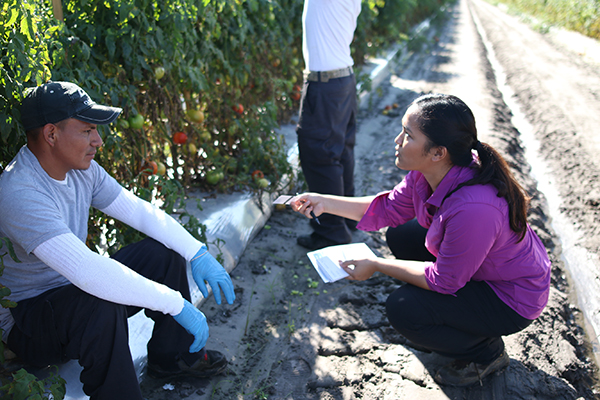
U.S. Department of Agriculture recognizes Worker-Driven Social Responsibility (WSR) as highest form of human rights protection in agriculture;
WSR, Collective Bargaining Agreements (CBAs) officially designated “Platinum” level labor protection in new USDA guestworker expansion pilot program, singled out for ability to “promote accountability and improve working conditions for domestic and H-2A workers alike…”;
USDA Secretary Tom Vilsack: “The program will provide incentives designed to simultaneously benefit workers and employers, with the potential to inform the H-2A program, raise labor standards for farmworkers, and help alleviate our agricultural workforce challenges over the long term.”
In the final weeks of September, the U.S. Department of Agriculture announced an unprecedented new initiative, the Farm Labor Stabilization and Protections (FLSP) Pilot Program, which has been years in the making. The FLSP was designed with two primary goals in mind: One, to address the growing human rights crisis in the H2A program — including last year’s massive human trafficking prosecution, dubbed “Operation Blooming Onion” by federal prosecutors, involving over 70,000 workers, $200 million in illegal profits, and two worker deaths; and two, to assist growers struggling to maintain a stable workforce as the country continues to grapple, largely unsuccessfully, with its longstanding immigration issues.
In announcing this new initiative, USDA Secretary Tom Vilsack recognized the challenges facing the U.S. agricultural industry and laid out the goals of the pilot:
“Our country is facing growing agriculture workforce challenges that jeopardize our farmers’ ability to be competitive, threatens the resiliency, abundance and safety of our food system, and has repercussions on our overall economy. At the same time, record numbers of people are interested in living and working in the United States, including from Northern Central America,” said Agriculture Secretary Tom Vilsack.
“This pilot program has been designed with significant input from immigration, labor, and agricultural stakeholders in an effort to help address these immediate challenges. The program will provide incentives designed to simultaneously benefit workers and employers, with the potential to inform the H-2A program, raise labor standards for farmworkers, and help alleviate our agricultural workforce challenges over the long term.
In addition to helping agricultural producers recruit and retain workers, at the end of the program we will have tested new ways to promote accountability and improve working conditions for domestic and H-2A workers alike – demonstrating how employers benefit by doing right by workers. The effort will also facilitate safe, orderly, and humane migration. This pilot should be a win for everyone along the agricultural supply chain, from the field to the dinner table.”
With incentives “designed to promote benefits and protections for workers,” the program supports applicants who commit to higher protections with higher financial awards, backed by a budget of up to $65 million in financial support and technical assistance. The highest level of assistance is dubbed the Platinum Award: “Beyond the essential public goods supported by Baseline Award projects, the Silver and Platinum Award projects offer meaningful improvements to working conditions for agricultural workers, further supporting food and agriculture supply chain resiliency.”
And that is where the USDA joined the U.S. Department of Labor, the Obama White House, and Customs and Border Protection in singling out the WSR model — among all other certification programs — for its unique power to protect workers’ fundamental human rights in global supply chains.
The distinction is in the details…
In the USDA’s analysis of the urgently-needed protections for our country’s guestworkers (found on Page 10 of the guidelines for the pilot), the Platinum-level Award is available only to employers who ensure both discrete improvements in employer policies, such as paid sick leave or overtime pay, and comprehensive, proven mechanisms and tools for workers to be the frontline monitors of their own rights. Specifically, a Platinum Award can only be achieved by being a part of a Worker-driven Social Responsibility (WSR) Program, having a Collective Bargaining Agreement (CBA) in place, or agreeing to “Neutrality, Access, and Voluntary Recognition” in the event workers seek to form a union.
With this distinction, this pilot not only brings the USDA into the growing ranks of U.S. government agencies recognizing the WSR model’s unique success in protecting workers’ rights, it actually breaks new ground, as it marks the first time a federal agency has designated WSR as an objective measure of an agricultural employer’s commitment to workers’ rights and a decisive indicator of a grower’s qualification for US government financial support.
In the bigger picture, the USDA’s analysis of the landscape of farmworkers’ rights in the U.S. joins a growing body of academic research, news articles, and government agencies that identify WSR as the gold standard among worker protection programs. With comprehensive worker-to-worker education protocols, a 24/7 multi-lingual complaint resolution process, unmatched in-depth auditing procedures by highly knowledgeable human rights monitors, and most importantly, market-based enforcement through commitments by Participating Buyers, the Fair Food Program and other WSR programs, like the Milk With Dignity Program, are able to provide multiple layers of protection for farmworkers on participating farms that other certification schemes simply can’t — and don’t — match.
We applaud the USDA’s effort to thoughtfully build a pilot program that provides meaningful incentives and support for agricultural employers who are making genuine efforts to ensure workers harvesting our country’s crops are safe, respected, and protected.
